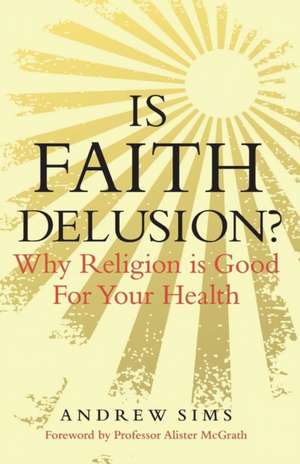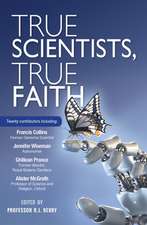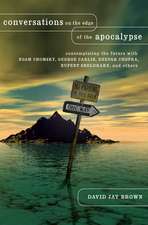Is Faith Delusion?: Why religion is good for your health
Autor Professor Andrew Simsen Limba Engleză Paperback – 8 mar 2009
Is faith delusion? Is religion bad for your health? How, in a scientifically and technologically advanced age, can people still believe in God/spirit/'other'? Clearly not all believers are primitive and ill-educated; an alternative explanation is that they must be mad, or at least severely neurotic (as suggested by Freud).
This book starts by looking at, and giving reasons for, the connection and the division between Christian faith and psychiatry. It asks whether science challenges Christians involved with psychiatry, as patients or professionals, and whether the spiritual needs of patients are recognised. The author examines the scope and use of the neuro-sciences and considers cause and effect, natural selection and determinism. He explores the overlap (and the difference) between psychiatric symptoms and religious belief, the possible association between demon possession and mental illness, and the idea that some people are intrinsically religious and some are not. The variations of personality are examined, with their implications for belief.
Posited as a statement, that faith is delusion is always hostile, but outcome studies (reviewed here) show that in general religious belief and practice convey good mental health. Religious faith and mental illness are different, and their concepts come from different world-views. A consideration of them in relation to each other is long overdue.
The author is a former Professor of Psychiatry and President of the Royal College of Psychiatrists, and has also been Chairman of their Spirituality and Psychiatry Special Interest Group, so is exceptionally well qualified to address the subject. Although the book is technically proficient, it is aimed at the general reader and is illustrated with stories, brief case histories and anecdotes.
Preț: 90.44 lei
Preț vechi: 146.72 lei
-38% Nou
Puncte Express: 136
Preț estimativ în valută:
17.31€ • 18.00$ • 14.29£
17.31€ • 18.00$ • 14.29£
Carte tipărită la comandă
Livrare economică 14-28 aprilie
Preluare comenzi: 021 569.72.76
Specificații
ISBN-13: 9781847063403
ISBN-10: 1847063403
Pagini: 252
Ilustrații: black & white illustrations
Dimensiuni: 138 x 216 x 20 mm
Greutate: 0.34 kg
Editura: Bloomsbury Publishing
Colecția Continuum
Locul publicării:London, United Kingdom
ISBN-10: 1847063403
Pagini: 252
Ilustrații: black & white illustrations
Dimensiuni: 138 x 216 x 20 mm
Greutate: 0.34 kg
Editura: Bloomsbury Publishing
Colecția Continuum
Locul publicării:London, United Kingdom
Caracteristici
Challenges Dawkins' argument head on by tackling, from a psychiatric perspective, the charge that faith is delusion.
Cuprins
1 'Psyche' means more than mind
2 What is Christian faith?
3 Why the warfare?
4 Psychiatry, science and faith
5 Can religion damage your health?
6 Delusion is a psychiatric term
7 The Intersection of Psychiatry and Belief
8 Inner and outer demons
9 Personality and personality disorder
10 Resolving the question
Recenzii
This authoritative book is a valuable resource for all who work in mental health and seek to justify the importance of spiritual care therein, and for others who wish to learn about belief and wellbeing.
And now for the yes. This is a thoughtful history of the struggle between religion and secular psychiatry... This personal account is also extremely frank and for that reason highly interesting. It is rare for a psychiatrist to write with so much emotion on his sleeve and for that reason alone it is to be welcomed.
This is a remarkable book...extremely competent, erudite and readable.
I have read this book with great admiration, with edification I would say, not just because I share the same religious dedication. However, I am a bit afraid to put it this way, as if it is no more than just a pamphlet written by an elderly man, who arriving at the end of his career needs to say once more what is only interesting for a certain incrowd. Nothing is further from the truth; we have definitely put that behind us. Sims accomplished to present a state of the art 'guideline' (not in a formal sense, of course), not in last place because he succeeded in shaping the apostolic admiration I earlier quoted in an irenic manner.
As the need to understand mental health better is genrally more recognised, and the debate between atheism and theism sharpens, this is a very important book.
Part theological apologetics and part medical psychology, this book would be particularly suitable for theological libraries, but could hold more general interest too. Summing up: Recommended. Upper-level undergraduates through professionals/practictioners.
Pastors will find this book useful as well as those who are professionally involved in psychiatry.
And now for the yes. This is a thoughtful history of the struggle between religion and secular psychiatry... This personal account is also extremely frank and for that reason highly interesting. It is rare for a psychiatrist to write with so much emotion on his sleeve and for that reason alone it is to be welcomed.
This is a remarkable book...extremely competent, erudite and readable.
I have read this book with great admiration, with edification I would say, not just because I share the same religious dedication. However, I am a bit afraid to put it this way, as if it is no more than just a pamphlet written by an elderly man, who arriving at the end of his career needs to say once more what is only interesting for a certain incrowd. Nothing is further from the truth; we have definitely put that behind us. Sims accomplished to present a state of the art 'guideline' (not in a formal sense, of course), not in last place because he succeeded in shaping the apostolic admiration I earlier quoted in an irenic manner.
As the need to understand mental health better is genrally more recognised, and the debate between atheism and theism sharpens, this is a very important book.
Part theological apologetics and part medical psychology, this book would be particularly suitable for theological libraries, but could hold more general interest too. Summing up: Recommended. Upper-level undergraduates through professionals/practictioners.
Pastors will find this book useful as well as those who are professionally involved in psychiatry.
Descriere
How, in a scientifically and technologically advanced age, can people still believe in God? This book examines the connection and the division between Christian faith and psychiatry and shows that, shockingly, religious belief is good for mental and physical health.








